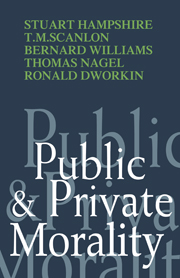Summary
‘Ceux qui voudront traiter séparément la politique et la morale n'entendront jamais rien à aucune de deux.’ So Rousseau in Émile, and it is a judgment in the classical Greek tradition which I accept. This book had its origins in the thought of one question in the vast, continuous subject of morals-and-politics: the question unforgettably displayed by Machiavelli for every subsequent generation to consider. His was the problem of political realism: what is the relation, and what ought to be the relation, between political violence and political deceit on the one side and, on the other, the minimum acceptable moral standards which define human decency and which encourage or permit a tolerable quality of social life? What are the limits to be set upon grossly immoral and cruel practices which sometimes also effectively protect and promote great public causes? These questions are always pressing and difficult to answer and they were re-formulated in many of the arguments circling around the Vietnam War. Hearing some of the principal defenders of American policy at the time, and reading some of the documents, one had the clear impression that a simplified Machiavellianism, a naive contempt for ‘moralistic’ attitudes, had in recent years become influential among policymakers in the U.S.A. and elsewhere.
- Type
- Chapter
- Information
- Public and Private Morality , pp. vii - viiiPublisher: Cambridge University PressPrint publication year: 1978



